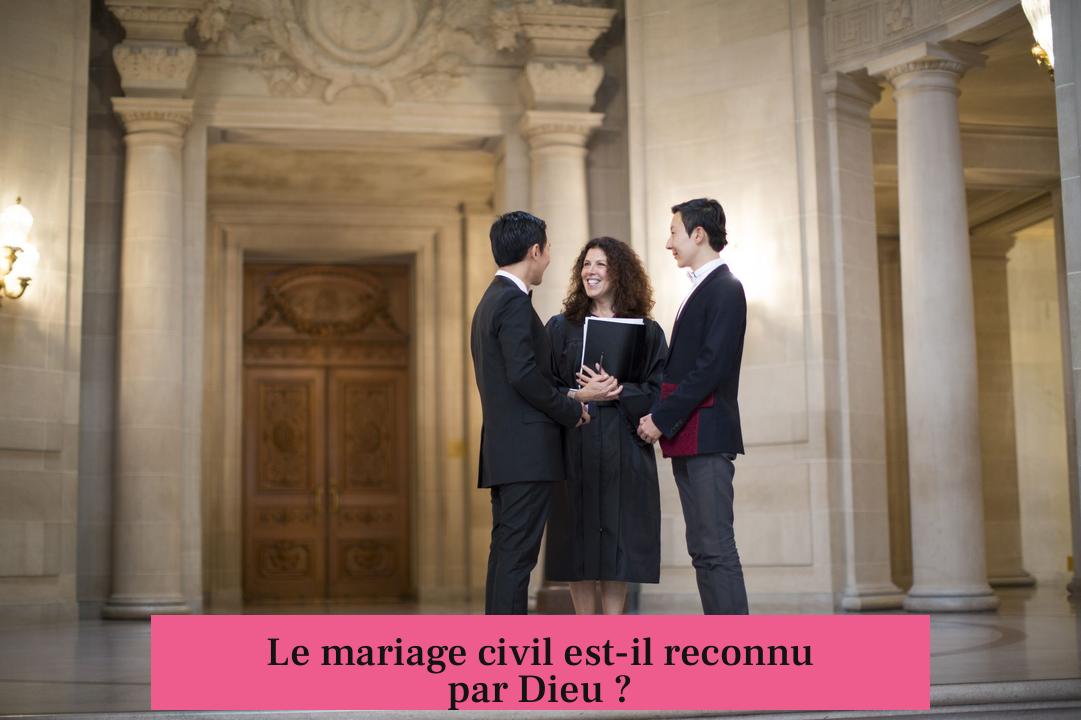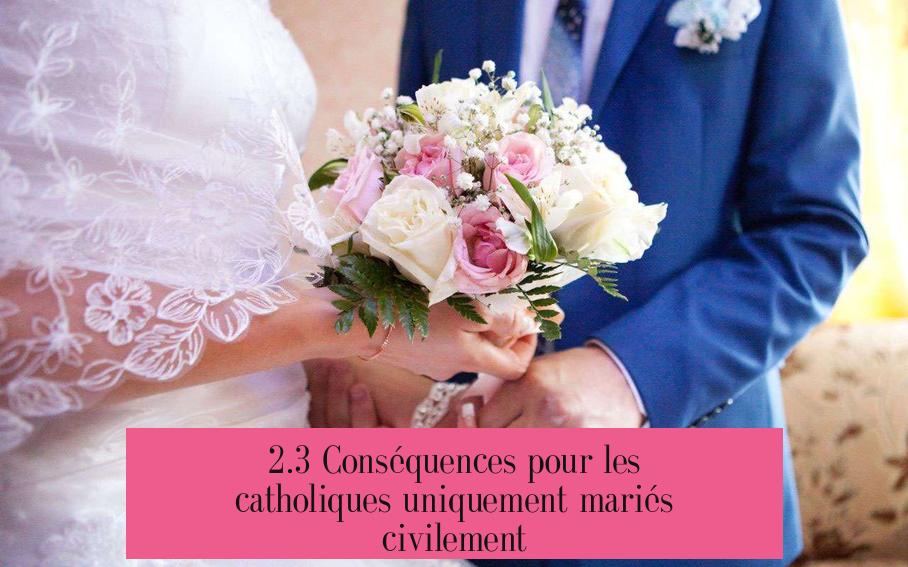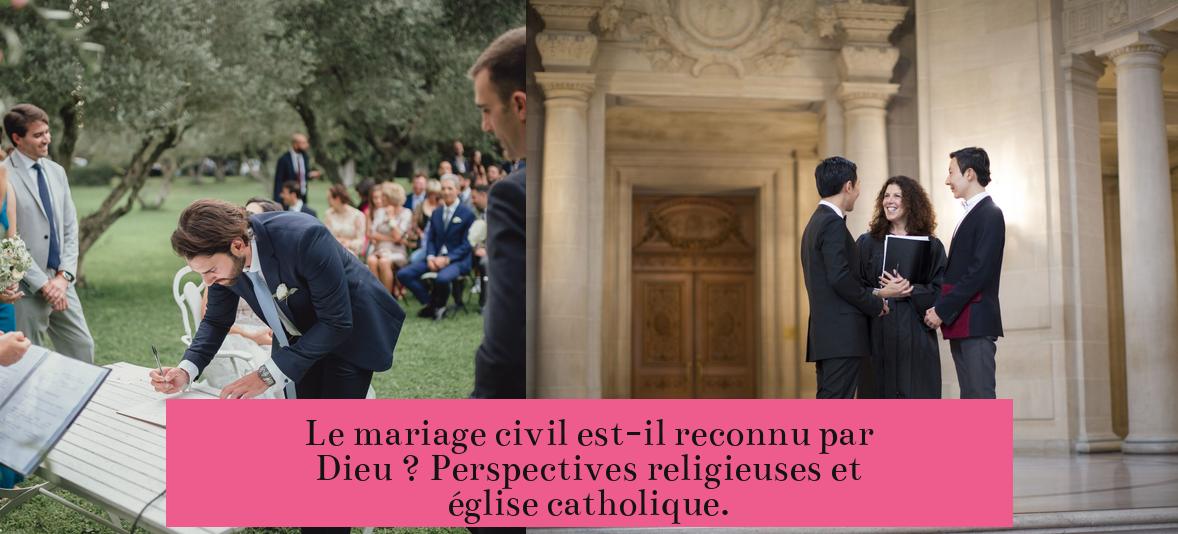Le mariage civil est-il reconnu par Dieu ?

Oui, le mariage civil est reconnu par Dieu comme une union valide entre un homme et une femme. Il s’agit d’une alliance matrimoniale fondée sur la base biblique d’une relation unique « une seule chair », vécue tout au long de la vie. Cette reconnaissance divise néanmoins la portée spirituelle et sacramentelle en fonction des contextes religieux.
1. Reconnaissance générale du mariage civil par Dieu
Le mariage est défini dans la Bible comme un lien indissoluble et exclusif. Jésus lui-même affirme, dans Matthieu 19:4-6, que Dieu unit l’homme et la femme pour qu’ils deviennent « une seule chair ». Ce lien, inscrit dans la Genèse, justifie la validité d’un mariage civil, même si une cérémonie chrétienne supplémentaire peut renforcer symboliquement cette union.
- Le mariage est un engagement de foi, d’amour sacrificiel et de fidélité.
- La relation sexuelle y est exclusive et représente une ouverture possible à la procréation.
- Dieu voit d’un bon œil tout pacte d’union fidèle entre un homme et une femme.
2. La position de l’Église catholique face au mariage civil
2.1 Différence entre mariage civil et mariage sacramentel
Dans la tradition catholique, un mariage civil est reconnu légalement par l’État, mais il n’est pas considéré comme un mariage sacramentel tant qu’il n’a pas été célébré selon le rite religieux adéquat. Le mariage sacramentel relie le couple dans la foi, bénit par Dieu.
2.2 Validité et reconnaissance du mariage civil par l’Église
| Type de mariage | Reconnaissance par l’État | Reconnaissance par l’Église | Notes |
|---|---|---|---|
| Marriage civil | Valide légalement | Reconnu comme valide mais non sacramentel | Appelle souvent à une convalidation |
| Marriage sacramentel | Valide légalement | Valide sacramentellement | Bénédiction divine complète |
La reconnaissance catholique demande que le couple reçoive le sacrement du mariage en présence d’un prêtre ou diacre. Une convalidation, autrement dit une bénédiction d’un mariage civil, garantit la grâce sacramentelle.
2.3 Conséquences pour les catholiques uniquement mariés civilement

- Absence des grâces spirituelles spécifiques au mariage sacramentel.
- Possibles restrictions dans l’accès à certains sacrements, comme la Communion.
- Difficultés potentielles pour élever les enfants dans la foi catholique.
- Il s’agit en pratique d’une union assimilée à une simple cohabitation.
2.4 Comment faire reconnaître un mariage civil par l’Église
- Assurer la liberté de mariage selon le droit canon (pas de mariages antérieurs non annulés).
- Demander une convalidation : une cérémonie religieuse officielle.
- Consulter le curé local pour organiser la bénédiction ou les préparations nécessaires.
- Suivre des cours de préparation au mariage proposés par le diocèse.
3. Considérations complémentaires
3.1 Mariage religieux et mariage civil
Un mariage civil est valide aux yeux de Dieu mais le mariage chrétien renforce l’union par la foi. Il est possible de renouveler ses vœux dans une église, ce qui apporte la dimension spirituelle manquante à la cérémonie civile.
3.2 Communion et mariage civil
Seuls les catholiques baptisés en état de grâce peuvent communier. Un mariage civil non reconnu par l’Église demande pénitence et convalidation pour rétablir l’accès à la Communion.
3.3 Fondements bibliques et théologiques

La Bible présente le mariage comme une institution divine, entre un homme et une femme, fondée sur l’amour fidèle et le dépouillement de soi. Il symbolise la relation entre le Christ et son Église.
4. Points essentiels à retenir
- Dieu reconnaît le mariage civil comme un engagement authentique entre un homme et une femme.
- L’Église catholique reconnaît légalement le mariage civil mais demande la bénédiction religieuse pour la validité sacramentelle.
- La convalidation permet de recevoir la grâce du sacrement et l’appui spirituel de l’Église.
- Un mariage civil seul peut limiter la participation aux sacrements pour les catholiques.
- La reconnaissance selon l’Église dépend du statut religieux et des conditions individuelles.
- Un accompagnement pastoral reste essentiel pour les couples souhaitant harmoniser leur union avec la foi.
Is a Civil Marriage Recognized by God? Unveiling the Divine Perspective
Here’s the million-dollar question: Is a civil marriage recognized by God? The short answer, happily, is yes. A civil marriage ceremony holds validity in God’s eyes as a covenantal union between a man and a woman. But—and there’s always a “but”—how the Church perceives such unions adds layers to what “recognition” truly means.
Marriage, after all, is no small affair. It’s described biblically as a lifelong bond—one flesh—woven by God’s own design, where two become one in spirit, mind, and body. It’s not just about signing papers or throwing a party; it’s a sacred commitment with deep roots in faith and tradition.
What Does It Mean for a Civil Marriage to Be Recognized by God?
Think of a civil marriage as the legal foundation of a building. It establishes the basic, necessary structure: two individuals commit to walking life’s journey together. From a theological standpoint, God views this union as valid because it reflects His creation’s original design (Genesis 2:24, Matthew 19:4-6). But, like a building, it can be further enhanced, enriched, or sanctified—typically through a religious ceremony.
A civil ceremony is valid in God’s eyes because it represents a covenant between man and woman. This resonates with the biblical narrative: marriage exists to unify a couple, support family life, and exemplify faithfulness.
The Catholic Church and Civil Marriages: A Delicate Dance
Now, enter the Catholic Church, with its clear distinctions and canonical rules. The Church recognizes civil marriage’s legality. It acknowledges that such unions establish rights and responsibilities under civil law. However, without the sacramental marriage rite, the Church stops short of recognizing civil marriages as fully valid in its religious context.
In Catholic teaching, a sacramental marriage is more than legal—it’s a sanctified bond, blessed by God, that carries spiritual grace and sanctity. Simply put, a civil marriage doesn’t automatically confer these spiritual gifts. Couples who marry civilly are usually encouraged to pursue convalidation, a Church ceremony blessing their union sacramentally.
What Does This Mean in Practice?

- Civil marriage: legally valid, recognized by the state.
- Church sacramental marriage: spiritually valid and blessed, recognized by the Catholic Church.
- Civil marriage without Church blessing: lacks sacramental grace for Catholics and may limit participation in sacraments.
For Catholics, marrying only civilly might feel like playing hopscotch on one foot—legal but missing some important spiritual footing.
Why Does the Church Insist on Sacramental Marriage?
The Church’s emphasis isn’t mere formality. Marriage embodies Christ’s love for the Church—a self-giving, sacrificial, and joyful unity reflecting divine love. When a couple receives the sacrament of matrimony, they partake in that grace and spiritual strength.
Without this sacramental bond, the couple misses out on certain graces that help them live out their marriage in faithfulness and joy. Moreover, participation in other Church sacraments may become complicated. For example, a Catholic married civilly and not convalidated might face restrictions on receiving Communion until the marriage is recognized by the Church.
Can a Civil Marriage Become Sacramental?
Absolutely! This is where convalidation shines. Couples with a civil marriage can approach their local parish priest to have their union blessed ceremonially. This process affirms the existing commitment before God and the community, turning a civil union into a sacramental marriage.
Sometimes, couples need to address previous marriages or impediments before receiving this blessing, which can involve annulments or declarations of nullity. These processes ensure that both parties are free to enter into a new sacramental bond according to Church law.
Steps to Align Civil Marriage with Church Teaching
- Consult your parish priest for guidance.
- Attend marriage preparation classes, often required by dioceses.
- Address any previous marital situations—like annulments if necessary.
- Schedule a convalidation ceremony to have your marriage blessed by the Church.
Such steps not only bless the marriage but also provide couples with spiritual tools and community support for their life together.
Religious Ceremonies and Civil Marriages
What if you already had a civil wedding but think “Hey, I want a blessing, too”? Fear not. You can have your civil marriage blessed later in a religious ceremony. This is common and welcomed in many Christian traditions. In fact, such ceremonies often include readings, prayers, and the reaffirmation of vows—all reinforcing the sacredness of the commitment.
While civil marriages can include readings or music, they typically exclude religious hymns or scripture. A church wedding, however, embeds these elements, connecting the couple’s union deeply to their faith.
Interesting fact:
Did you know eloping can be a fantastic way to have a focused, intimate Christian wedding? Without the bells and whistles of large ceremonies, couples can cherish their union solely before God and each other. And, yes, their minister can officiate, bringing that sacred touch!
Biblical Foundations Behind Marriage Recognition
Scripture builds the theological cornerstone for why civil marriage is recognized by God but considered incomplete without sacramental sanctification for Catholics. Key verses lay out the concept that marriage is between a man and a woman, designed for lifelong faithfulness and mutual care.
Genesis 2:24 teaches that a man shall leave his family and unite with his wife, becoming “one flesh”—an intimate, unbreakable bond. Jesus echoes this in Matthew 19:4-6, emphasizing the permanence of marriage in God’s eyes.
Marriage thus reflects divine love and grace—sacrificial yet joyous. It’s about commitment beyond fleeting feelings, grounded in faith and mutual respect.
Pastoral Realities and Individual Circumstances
Not one-size-fits-all here. The Church navigates pastoral sensitivity based on each couple’s situation. For example, baptized non-Catholics who marry civilly might find their union automatically considered sacramental post-baptism. Conversely, Catholics who enter civil marriages without fulfilling canonical form may face pastoral guidance to help regularize their marriage.
Divorce, prior marriages, or previous civil unions complicate matters but are addressed pastorally with due diligence. The Church aims to be a shepherd, not a judge, balancing doctrine with compassion.
Summary of the Essentials
| Aspect | Civil Marriage | Catholic Church Perspective |
|---|---|---|
| Legal Status | Valid and recognized by the state | Recognizes legal validity |
| Spiritual/Sacramental Status | Not sacramental by default | Requires convalidation for sacramental grace |
| Sacramental Participation | May be limited | Restored after convalidation |
| Pastoral Support | Varies | Guided with care and process |
So, What’s Your Take?
Is your civil marriage recognized by God? Yes, as a covenantal union reflecting God’s design. Is it recognized by the Catholic Church as sacramental? Not automatically. The Church invites you to deepen your commitment through the sacrament of matrimony. Isn’t that a comforting thought—a chance to ground your love in both legal and divine soil?
After all, marriage is not just about law or ritual, but relationship—between spouses and with God. It’s about love, sacrifice, joy, and faithfulness. Whether you walk down the aisle once or twice, what matters is the journey you commit to, together and with the Divine.
What steps might you consider to align your marriage more closely with your faith tradition? How does your community support you in this sacred journey? Share your thoughts or questions below—because marriage, after all, is a beautiful conversation, both human and divine.
Une union civile est-elle reconnue par Dieu ?
Oui, une union civile est reconnue par Dieu comme un engagement entre un homme et une femme. Cependant, certains peuvent choisir de renouveler leurs vœux lors d’une cérémonie chrétienne pour affirmer leur lien devant Dieu.
La différence entre mariage civil et mariage sacramentel chez les catholiques ?
Le mariage civil est reconnu par l’État pour ses droits légaux, mais pas comme un sacrement par l’Église catholique. Le mariage sacramentel implique une cérémonie religieuse et la bénédiction divine.
Le mariage civil peut-il être validé par l’Église catholique ?
Oui, dans certains cas. L’Église peut reconnaître un mariage civil s’il n’existe aucun empêchement canonique et si le couple demande la convalidation, qui est une bénédiction religieuse de leur union.
Quelles sont les conséquences pour un catholique marié seulement civilement ?
Un mariage civil seul n’apporte pas la grâce sacramentelle. Le couple peut être privé de certains sacrements, et leur union n’est pas reconnue comme un mariage religieux par l’Église.
Comment un couple peut-il faire reconnaître son mariage civil par l’Église catholique ?
Le couple doit s’assurer d’être libre de tout obstacle canonique et demander la convalidation via une cérémonie religieuse. Sans cela, le mariage reste reconnu uniquement par l’État, pas par l’Église.

